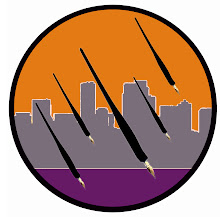But for what?
Decisions
We make decisions every day, and even the smallest affect the course of our life. For instance: soy milk or almond? Okay, maybe that one doesn't have a significant impact, but the experience is different, and those experiences do put you on a slightly different fork of the road than you would have been on otherwise. Even the act of writing this blog sends out little ripples into the course of my life and the lives of those who read it.
But what about those moments when you reach one of those big forks, where the course you choose takes you off the well-traveled path you’re familiar with and sends you into the unknown? Like getting on that airplane that’s going to take you overseas for the first time, or debating that job offer that will take you across the country, or looking at your girl and thinking, I’m going to marry her.
That’s where I feel like I’m at today. The road hasn't forked yet, but I can see it running up towards this mountain with the words BIG DECISION carved in the rock face, and I have no idea how my life is going to look afterwards.
That decision is going to come in the form of an email with British 1’s and 0’s. My editor is going to tell me just how close I am to publishing, and then…
Do I just have more of the same to look forward to? Do I throw in the towel? Start something new? Revel in her praise, put To Kill the Goddess on Amazon, and focus even harder on writing the next?
The wait is driving me crazy!
Good Advice
So there’s this kid at work. He’s a writer, or at least on his way to being one. He found out that I write and we ended up at lunch, where he proceeded to tell me all the problems he’s having with his writing. It was so familiar – like listening to myself from a decade ago – trying to figure out how to do the most basic things.
So I gave him a few pointers, a little try this, or how about that, and it felt good to be able to help someone out – even if only a little bit. But then he really began to open up, and his questions turned into a litany of self-doubt. How he doesn't measure up to JK Rowling, or his own expectations, and how sometimes he despairs of ever being any good.
I finally stopped him and said, “Don’t be so hard in yourself. You are at the beginning of a lifelong journey and you can’t expect to be perfect right out of the gate. Think about how many canvases Claude Monet must have thrown away before painting waterlilies. And consider that I recently heard an interview where Stephen King said how ten years ago he wasn't a good enough writer to write his new book.”
He looked at me, really looked at me for maybe the first time we sat down, and I said, “Be patient with yourself. Put words on the page. The rest will come with time.”
Maybe I should listen to myself, eh?
That fork will get here when it gets here, and when it does, I’ll face what comes (or doesn't).
The unknown will resolve itself when – as my father would say – it’s damn good and ready.
I just wish it would hurry the fuck up.



.jpg)

